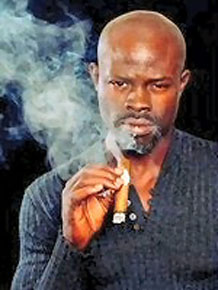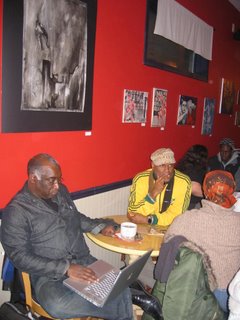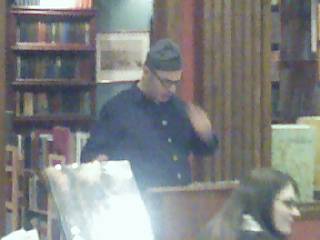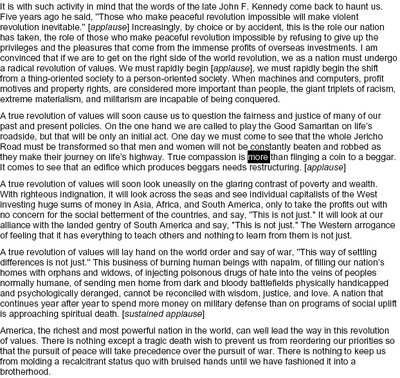 I never tire of watching Serena Williams play; in addition to her heartstopping talent, singular fashion sense, and on-court expressivity, she always carries about her person and career the requisite amount of drama, and her performance at this year's Australian Open did not disappoint. After missing nearly all of 2006 with one of the many injuries that have increasingly plagued her in recent years (and also provided her with time to begin her acting career and hit the town with the likes of Rick Fox), and with many of the tennis world's pundits decrying her lack of fitness and declining abilities, the 25- year-old star and two-time champ returned to Melbourne unseeded, and proceeded to plow through the field of ranked women, becoming only the second unseeded woman in the history of the Australian Open to do so. In the final, against the new international darling, Maria Sharapova, Serena put on a demonstration clinic, serving and acing her opponent 6-1, 6-2, which brought her a 3rd Australian Open title, and her 8th Grand Slam victory. During the trophy presentation (pictured above, AP Photo/Rick Stevens), she was as charming and gracious as possible, and dedicated the win to her slain older sister Yetunde Price ("I love her very much" was Serena's moving tribute). Serena's elder, diffident, cygnine sister Venus, the pioneer of the sisters' winning ways, with back to back Wimbledon and US Open wins half a decade ago, was absent as well, suffering through her own spate of injuries and thus unable to participate , though anyone who's followed these two for more than a hot minute could easily imagine they'd probably decided that this major tournament was Serena's to walk away with. And, being the embodiment of fierceness, she did.
I never tire of watching Serena Williams play; in addition to her heartstopping talent, singular fashion sense, and on-court expressivity, she always carries about her person and career the requisite amount of drama, and her performance at this year's Australian Open did not disappoint. After missing nearly all of 2006 with one of the many injuries that have increasingly plagued her in recent years (and also provided her with time to begin her acting career and hit the town with the likes of Rick Fox), and with many of the tennis world's pundits decrying her lack of fitness and declining abilities, the 25- year-old star and two-time champ returned to Melbourne unseeded, and proceeded to plow through the field of ranked women, becoming only the second unseeded woman in the history of the Australian Open to do so. In the final, against the new international darling, Maria Sharapova, Serena put on a demonstration clinic, serving and acing her opponent 6-1, 6-2, which brought her a 3rd Australian Open title, and her 8th Grand Slam victory. During the trophy presentation (pictured above, AP Photo/Rick Stevens), she was as charming and gracious as possible, and dedicated the win to her slain older sister Yetunde Price ("I love her very much" was Serena's moving tribute). Serena's elder, diffident, cygnine sister Venus, the pioneer of the sisters' winning ways, with back to back Wimbledon and US Open wins half a decade ago, was absent as well, suffering through her own spate of injuries and thus unable to participate , though anyone who's followed these two for more than a hot minute could easily imagine they'd probably decided that this major tournament was Serena's to walk away with. And, being the embodiment of fierceness, she did.+++
A study by Joni Hersch, a law and economics professor at Vanderbilt University, confirms something that I've always figured, and which makes perfect sense given the history and ongoing problems of our society: the lighter-skinned (and taller) an immigrant, the more she or he will make. As Travis Loller reports in his article, "Study Says Skin Tone Affects Earnings," in today's Washington Post, Hersch controlled for other factors and found that skin-tone still appeared to be the key in earnings differences. Yet despite the fact that many cultures have a bias towards lighter skin tones and hues, the key factor according to the study was a US preference, above and beyond that of the immigrant's original culture or society. Quoting the article:
"On average, being one shade lighter has about the same effect as having an additional year of education," Hersch said.
The study also found that taller immigrants earn more than shorter ones, with an extra inch of height associated with a 1 percent increase in income.
Other researchers said the findings are consistent with other studies on color and point to a skin-tone prejudice that goes beyond race.
Hersch took into consideration other factors that could affect wages, such as English-language proficiency, education, occupation, race or country of origin, and found that skin tone still seemed to make a difference in earnings.
That means that if two similar immigrants from Bangladesh, for example, came to the United States at the same time, with the same occupation and ability to speak English, the lighter-skinned immigrant would make more money on average.
"I thought that once we controlled for race and nationality, I expected the difference to go away, but even with people from the same country, the same race _ skin color really matters," she said, "and height."
Although many cultures show a bias toward lighter skin, Hersch said her analysis shows that the skin-color advantage was not due to preferential treatment for light-skinned people in their country of origin. The bias, she said, occurs in the U.S.
Economics professor Shelley White-Means of the University of Tennessee at Memphis said the study adds to the growing body of evidence that there is a "preference for whiteness" in America that goes beyond race.
The Post article contains more specifics about Hersch's methodology and sample size, and notes that it correlates with a study that William Darity Jr., an economic professor at the University of North Carolina, conducted on skin tone and wages among Black people. (I would even go so far as to venture that were similar studies conducted in every nation in the Americas, the results would be similar.) Hersch will be presenting her findings at the American Association for the Advancement of Science in San Francisco next month, and suggested that this might be another route for legal redress (though I do believe there have been some skin-color suits in the past). Finishing this article, I thought again of discussions, with friends and acquaintances, as well as pieces I've come across online and elsewhere, on the persistence of skin-color discrimination, both within specific groups (African Americans, Latinos, etc.) and of course in the broader society, pointing to an enduring racist and supremacist social logic that all the expressions and performances of Black Is Beautiful or overt and covert acts of resistance, assertion and counterargumentation won't dispel, at least not any time soon.
+++
Last quarter, the university's Center for Writing Arts brought playwright Rebecca Gilman to campus to speak about her work. I ended up only catching a small part of the talk because of a prior engagement, but I did purchase one of her plays, the highly praised Spinning into Butter, which explores the crisis that ensues at small Vermont college when someone starts posting anonymous, racist letters on the door of one of the college's few African American students. The situation is not, however, as it initially seems, as the college's administrators soon eventually discover. I haven't finished the play, but I was curious to find out if any Jstheater readers had seen the play staged and what your impressions were. I also saw on imdb.com that Mark Brokaw's film version of the story, starring Sarah Jessica Parker, Miranda Richardson, Beau Bridges, Mikelti Williamson, and Victor Rasuk, has completed filming and may hit screens later this year. That's another incentive to finish the play....

 I was happy to see that President
I was happy to see that President 
 The Democratic field grows larger by the day. As has been widely predicted for several years, New York's junior Senator and the first First lady ever to serve in Congress,
The Democratic field grows larger by the day. As has been widely predicted for several years, New York's junior Senator and the first First lady ever to serve in Congress,  In addition, today
In addition, today  Some years ago, an acquaintance traveled to
Some years ago, an acquaintance traveled to 











 Tomorrow's upcoming event, from
Tomorrow's upcoming event, from 

 One thing I heard today via email was that
One thing I heard today via email was that 







 A Democrat also made history today in Massachusetts.
A Democrat also made history today in Massachusetts. 









